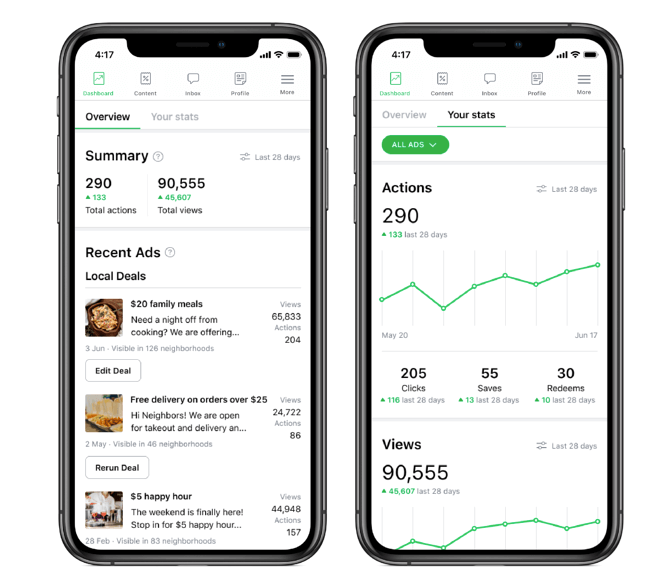Nextdoor rolls out free Business Posts, best practices advice
Nextdoor is slowly building out a suite of paid and free promotional tools for national-local brands and SMBs.
Nextdoor introduced Business Posts this week. This is one of a number of tools and features the company has rolled out to support small business owners during COVID-19.
Business Posts are free to owners but require a claimed local business page to begin. They appear in the Nextdoor neighborhood newsfeed.
Examples of Nextdoor Business Posts

Two-mile reach. The company says Business Posts will “reach all neighbors within two miles of your business.” That appears to be the maximum radius, so it won’t address the needs of all service area businesses. I imagine, however, that Nextdoor will make adjustments as they look at the data and receive feedback from business owners.
Businesses get two posts per month for free. The company was silent on whether there would be a paid option for greater frequency. That option may be on the whiteboard, however. If there are more than five posts in the neighborhood feed at once, from multiple businesses, Nextdoor will consolidate them into a carousel.
Post optimization tips. While the immediate use case is COVID communications (e.g., curbside pickup, precautions we’re taking, reopening notifications), Nextdoor offers a number of other example uses in its blog post, including promoting job openings.
Nextdoor has a companion post that offers best practices tips for maximizing the exposure and effectiveness of Business Posts:
- Posts with at least 5 recommendations have 30% higher engagement
- Post between 5 – 7 pm for higher engagement
- Posts on Thursday and Friday see more engagement than weekend or early-week posts
- Post at least once every two weeks
- Posts with photos and business pages with profile photos are more visited and have greater engagement
Business Page dashboard with Deals, Posts metrics

Analytics and performance data. Engagement insights will be coming to the business owner dashboard, which is rolling out nationally this month. Businesses will be able to track performance of Local Deals ads and Business Posts. Soon they’ll also be able to see page views and user recommendations.
Research conducted earlier this year by Nextdoor found “72% of [Nextdoor] members believe they will frequent local businesses more often” following COVID-19. This may or may not factually be correct but, at a minimum, it reflects the desire of people to support local businesses.
Nextdoor has also been trying to “reform” its site culture and minimize stereotyping and racism, which have flared up recently in the wake of the Black Lives Matter protests. The site has said in a recent email from CEO Sarah Friar that it has a zero-tolerance policy for “racist behavior.”
The site operates in 11 countries and has coverage of roughly 250,000 local neighborhoods. It’s heading toward an eventual IPO.
Why we care. Monetizing small businesses on the platform is relatively recent. For several years, Nextdoor has been courting national brands that have a local presence (e.g., retailers) or want to market to local consumers. The neighborhood context of Nextdoor makes that a very different proposition from location targeting on large platforms such as Google, Facebook or even Yelp.
The site offers direct sales and makes ad inventory available programmatically via third parties. It offers a range of targeting options, including interests, behaviors and lookalikes.
Early last year, Nextdoor said there were more than 2 million small businesses operating on the platform. That number is probably double or more than double today. Among the larger user base there are undoubtedly many more small business owners that haven’t formally set up business pages. The free Business Posts offering is an incentive for them to do so.
As I’ve said in the past, Nextdoor is one of the very few consumer-facing sites with the scale and opportunity to give the incumbent ad platforms a run for their money in local.
Contributing authors are invited to create content for Search Engine Land and are chosen for their expertise and contribution to the search community. Our contributors work under the oversight of the editorial staff and contributions are checked for quality and relevance to our readers. Search Engine Land is owned by Semrush. Contributor was not asked to make any direct or indirect mentions of Semrush. The opinions they express are their own.


